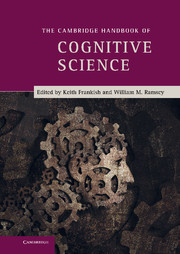Book contents
- The Cambridge Handbook of Cognitive Science
- The Cambridge Handbook of Cognitive Science
- Copyright page
- Contents
- List of figures and tables
- Contributors
- Acknowledgments
- Introduction
- Part I Foundations
- Part II Aspects of cognition
- 4 Perception
- 5 Action
- 6 Human learning and memory
- 7 Reasoning and decision making
- 8 Concepts
- 9 Language
- 10 Emotion
- 11 Consciousness
- Part III Research programs
- Glossary
- Index
9 - Language
from Part II - Aspects of cognition
Published online by Cambridge University Press: 05 August 2012
- The Cambridge Handbook of Cognitive Science
- The Cambridge Handbook of Cognitive Science
- Copyright page
- Contents
- List of figures and tables
- Contributors
- Acknowledgments
- Introduction
- Part I Foundations
- Part II Aspects of cognition
- 4 Perception
- 5 Action
- 6 Human learning and memory
- 7 Reasoning and decision making
- 8 Concepts
- 9 Language
- 10 Emotion
- 11 Consciousness
- Part III Research programs
- Glossary
- Index
Summary
Keywords
- Type
- Chapter
- Information
- Publisher: Cambridge University PressPrint publication year: 2012
- 3
- Cited by



